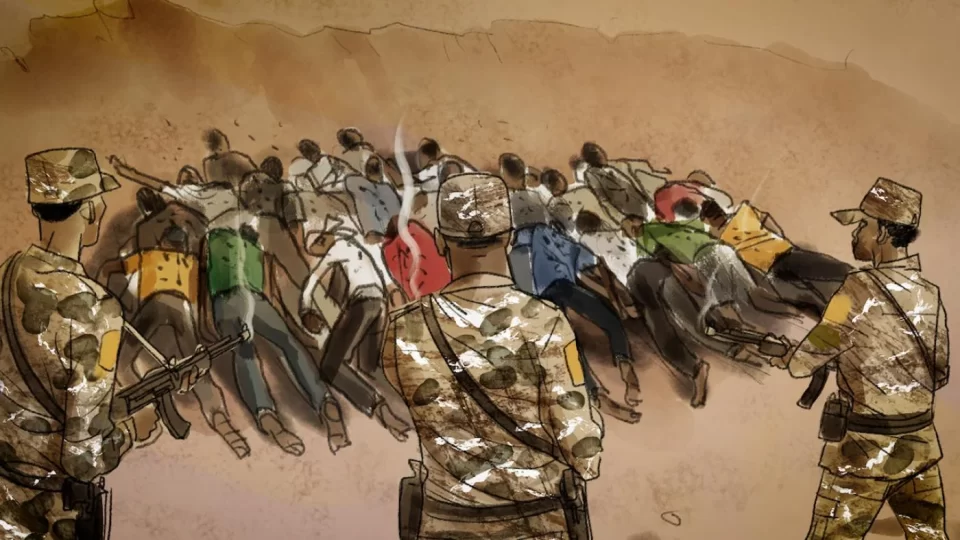AP, Reuters Challenge WHO Leader’s Contention
Short Takes: Prince at age 11; Ricardo Zuniga; Cheryl Duvall; statehouse coverage; Narda Jones; Bakari Sellers; Catalina Camia; NPR’s “Code Switch”; ASU Cronkite School and Native American journalists; Royce Miles; James Hill; Senate Democrats and Black journalists; Dwayne Haskins; Michele Norris; USA Today’s free graphic novel on Black evictions; Chris Wallace and Nikole Hannah-Jones;
Chauncey Bailey; Lee Bey; Nicholas Casey; SPJ in Puerto Rico; disinformation in communities of color; Barack Obama; Alexandra White; Jonathan Capehart; Arnold Diaz; Corey Johnson; Maya Brown; William Monroe Trotter; Melanie Eversley; Haitian Times; Luis Patiño;
Lee Bey; El Salvador press-freedom crackdown; Mexican pair’s revelations from public records; Dalit-caste journalists; tracking attacks on African journalists; Western Sahara omitted; police assault on Cuban journalist.
Homepage photo: Ethiopia-Tigray conflict, by Human Rights Watch
Support Journal-ismsDays before Russian President Vladimir Putin sent troops into Ukraine, Martin Kimani, Kenyan ambassador to the United Nations, stood up at the emergency session of the U.N. Security Council to warn Russia to desist from attacking its neighbor. He attributed the world’s instability to powerful countries that assault the U.N. Charter by pursuing objectives that run counter to international peace and security. (Credit: YouTube)
AP, Reuters Challenge WHO Leader’s Contention
The director-general of the World Health Organization charged Wednesday that the news media are not treating crises around the world equally, and that racism plays a role. Tedros Adhanom Ghebreyesus is not the first to say that, and how one reacts depends on the media one consumes, where one’s self-interest lies and one’s preconceived notions.
As Maria Cheng reported for the Associated Press, Tedros “questioned whether ‘the world really gives equal attention to Black and white lives’ – given that the ongoing emergencies in Ethiopia, Yemen, Afghanistan and Syria have garnered only a ‘fraction’ of the global concern for Ukraine.
“Tedros acknowledged the war in Ukraine is globally significant, but asked if other crises are being accorded enough attention.
“He also critiqued the media for what he said is its failure to document the ongoing atrocities in Ethiopia, noting that people had been burned alive in the region. ‘I don’t even know if that was taken seriously by the media because of their ethnicity,’ he said. ‘So we need to balance. We need to take every life seriously because every life is precious.’ ”
Tedros, who is from the war-torn Tigray section of that country, “said since a truce was declared in the besieged northern region of Ethiopia three weeks ago, about 2,000 trucks should have been able to enter with food, medicine and other essentials.
“Instead, only about 20 trucks have arrived, said Tedros, a former minister of health in Ethiopia.
“ ‘As we speak, people are dying of starvation,’ he said. ‘This is one of the longest and worst sieges by both Eritrean and Ethiopian forces in modern history.’ ”
Last month, the United Nations raised less than a third of the $4.27 billion requested for relief efforts in Yemen, according to Laurin-Whitney Gottbrath, writing March 17 for Axios, in what has been described as the world’s worst humanitarian crisis.
Gottbrath wrote Friday, “In the more than seven years since fighting between a Saudi-led coalition and the Iran-[backed] Houthi rebels began, hundreds of thousands have died of direct and indirect causes and more than 4.3 million people have been internally displaced.” Critics say the United States, which backs the Saudis, shares responsibility.
Two billion people, or a quarter of the world’s population, now live in conflict-affected areas, according to the United Nations, the most conflict since 1945, according to U.N. Secretary-General Antonio Guterres.
Still, polls show that as much as Americans are horrified and repulsed by the Russian invasion of Ukraine, they are more concerned about pocketbook issues such as inflation.
Spokespersons for the New York Times and Washington Post did not respond to requests for comment on Tedros’ accusation.
Lauren Easton replied for the Associated Press, “I’d point you to AP’s standout coverage of Tigray.
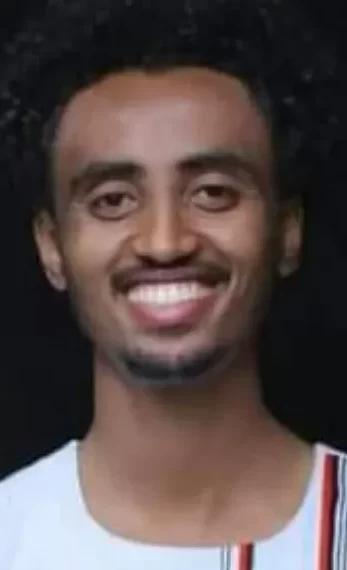 “You might recall that AP freelancer Amir Aman Kiyaro (pictured) was detained in Ethiopia for four months for his work covering the conflict and was just released on bail on April 1. The investigation against him continues.”
“You might recall that AP freelancer Amir Aman Kiyaro (pictured) was detained in Ethiopia for four months for his work covering the conflict and was just released on bail on April 1. The investigation against him continues.”
Easton added: “AP continues to report on Yemen, Afghanistan and Syria, of course.
“AP won the Pulitzer Prize for International Reporting in 2019 for its Yemen civil war coverage.
“See AP Syria coverage here.
“Afghanistan. (News director Kathy Gannon and others report from inside the country. See Kathy’s latest here.”
A spokesperson for Reuters replied, “Reuters is deeply committed to covering the conflicts happening around the world and to ensuring our coverage is global. We have staff in 200 locations around the globe covering these conflicts and wider news from both a local and global perspective, including, for example, the war in Ethiopia, which has been the subject of extensive investigations by Reuters since the conflict erupted.”
Still, few would deny that the massive coverage of Russia’s invasion of Ukraine, justified by the global consequences, emotional ties, news-media accessibility and the threat of nuclear war, dwarfs that of the other conflicts.
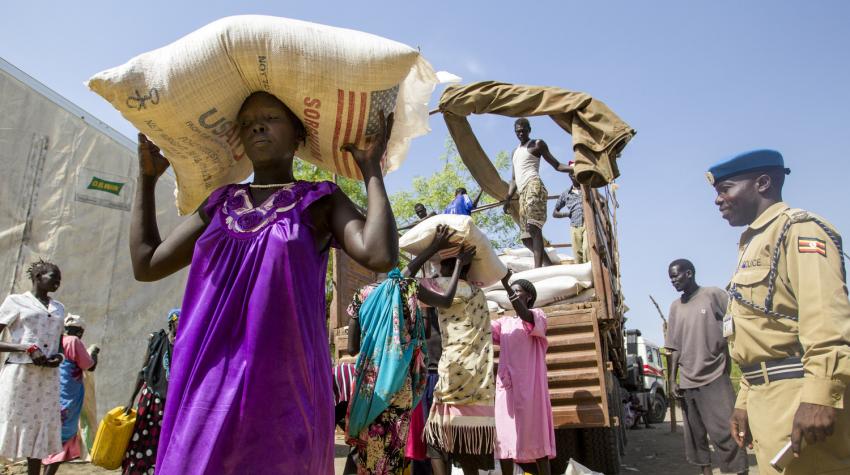
But is race a factor? Those who say yes maintain that that element costs the United States as well as the countries in crisis.
“I was in New York last week,” the United Nations High Commissioner for Refugees, Filippo Grandi, said April 11 on the “PBS NewsHour.” “I met all the African ambassadors to the United Nations. They’re very worried that this big effort to respond to the crisis in Ukraine distracts the international community from solidarity with African countries that also are hit by very, very severe humanitarian crises.”
On “Democracy Now!” Jayati Ghosh, an economics professor at the University of Massachusetts Amherst who taught for 35 years at Jawaharlal Nehru University in New Delhi, India, said Wednesday, “I don’t think people in the West realize it — is the extent to which the hypocrisy in the sort of moral double standards are evident in this Ukraine war. I mean, yes, it is terrible, what is happening. It is a brutal and completely unjustified invasion, and people are dying, and people are suffering.
“But more people have died in Yemen in the last three months, with arms provided by the U.S. and very, very brutal attacks. Children are starving in Yemen and in Afghanistan because of U.S. policy.
“And so, you know, everyone else in the world is saying, ‘How come it’s only when there are white Europeans who are affected that you care at all?’ I think the — you know, really, I don’t think people in the West realize the extent to which they have absolutely lost moral legitimacy in terms of the very, very different reaction they have exposed in this war to white European lives and all other lives in the rest of the world. This is not lost to anyone in the developing world. There is a very, very strong reaction.”
On the same program Friday, author Vijay Prashad went further. “There was an appalling bombing of the maternity hospital in Mariupol,” Ukraine. “You know, immediately thereafter, the U.S. government talked about war crimes. The International Criminal Court was suborned to say that this is going to have a file open, you know, for war crimes personally against [Russian President Vladimir] Putin and so on.
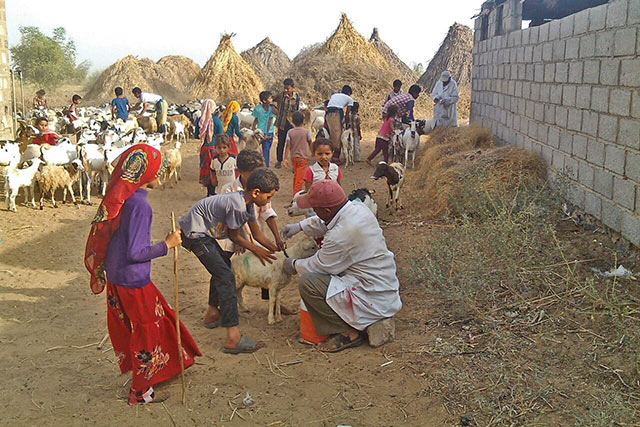
“But have we forgotten the Amiriyah shelter [in Iraq], 1,500 civilians killed in 1991 when the United States bombed a shelter, knowing full well there were civilians there? No question of any interrogation of war crimes. The language of war crimes was not used in Libya after NATO quite ruthlessly bombed that country. Peter Olson of NATO, the lead attorney, said openly, ‘Look, NATO can’t commit war crimes. War crimes are committed by other people, not by NATO.’ [Olson said NATO did not deliberately target civilians].
“I mean, just this recent month, there were Israeli airstrikes which struck the Rimal medical center, two doctors killed. Do we know their names? Ayman Abu al-Auf and Moeen al-Aloul. I mean, they were killed in the middle of all this, but there was no question of calling the Israeli strikes war crimes.”
Kenya’s U.N. ambassador, Martin Kimani, won praise on Feb. 24 when he compared Russian aggression to that of Africa’s former colonial masters.
But at a March 4 webinar hosted by the U.S. Department of State in Cape Town, South Africa, African journalists were skeptical of the notion that Africa should join in the Western condemnation. “This is not our war,” a reporter from Madagascar told Molly Phee, U.S. assistant secretary of state for African Affairs.
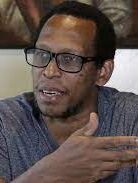 “Africans, including myself, who have pointed out the racist hypocrisies of Western media, governments and societies evident in the response have been accused of a convenient whataboutism which blinds us to the suffering of Ukrainians,” wrote Patrick Gathara (pictured), a Nairobi-based writer and cartoonist, on March 23. “Further, others have suggested that Africans are guilty of similar hypocrisies to those they accuse the West of, seemingly more concerned about events and crises thousands of miles away but happy to ignore the many crises on their own doorstep.
“Africans, including myself, who have pointed out the racist hypocrisies of Western media, governments and societies evident in the response have been accused of a convenient whataboutism which blinds us to the suffering of Ukrainians,” wrote Patrick Gathara (pictured), a Nairobi-based writer and cartoonist, on March 23. “Further, others have suggested that Africans are guilty of similar hypocrisies to those they accuse the West of, seemingly more concerned about events and crises thousands of miles away but happy to ignore the many crises on their own doorstep.
“Much of this is true.”
Gathara also wrote that some Africans “seem unable to recognise that what the world looks like to a large extent depends on where one is standing. And that many here are responding not so much to the invasion itself, but rather to Western reactions to it, which have rekindled long-running grievances that much of Africa has had with the West.”
One of those grievances has been how the West covers the rest of the world, particularly Africa. In January, African organizations announced they “will put 20 leading global media platforms under the microscope to analyse how they tell Africa’s stories, whose voices are being heard, which topics are prioritised and how they are covered. The Global Media Index will also highlight best practices in reporting on the continent.”
Washington Post columnist Eugene Robinson, himself a former Post foreign editor, observed about Ukraine March 14, “Whether intentionally or subconsciously, news organizations make this war more vivid and more tragic by focusing so tightly on victims and refugees. We get to see them as individuals, not as an undifferentiated mass. Viewers and readers are invited, if not forced, to imagine ourselves in similar circumstances.”
That’s not true of Myanmar, Ethiopia, Yemen, Syria and other countries in crisis.
Britain’s Guardian editorialized March 17, aid agencies “find the multiple conflicts, the disastrous conditions in Afghanistan and what is described as the worst-ever hunger crisis in South Sudan have left them torn between grim choices.
“More humanitarian funding is needed, alongside political will and diplomatic energy. The victims of these other wars deserve the same level of support and solidarity rightly seen for the people of Ukraine. Those already too often overlooked must not be pushed further into the shadows.”
- Yasmine Ahmed and Emilie McDonnell, Human Rights Watch: UK Plan to Ship Asylum Seekers to Rwanda is Cruelty Itself
- Ahmed Al-Haj and Samy Magdy, Associated Press: Yemen’s president steps aside amid efforts to end war
- Jonathan Capehart with Zhan Beleniuk, “The Sunday Show,” MSNBC: Ukraine’s first and only Black MP, Zhan Beleniuk, lets Americans know what Ukrainians need (March 20) (video)
- Tim Cocks, Reuters: South Africa’s Ramaphosa blames NATO for Russia’s war in Ukraine (March 18)
- Mike Ludwig, Truthout: Ukraine and Yemen Wars Highlight US’s Role as Biggest Arms Dealer in the World
- Philip Marcelo, Associated Press: Yemen’s president steps aside amid efforts to end war
- Michel Martin, NPR: One expert’s surprise over how [Romanians] reacted to Ukrainian refugees
- Marcus Mitropoulos, Capital Current, Canada: Ottawa’s Black community rallies for Ukraine refugees facing racism in flight from Russia’s invasion
- Tobore Ovuorie, Deutsche Welle: Ukraine war: African students face Russian missiles and racism
- Reporters Without Borders: War in Ukraine: Beware of China’s amplification of Russian propaganda, RSF says
- Bruce Riedel, Brookings Institution: Yemen war turns seven (March 24)
- United Nations High Commissioner on Refugees: Displaced Syrians face bleak Ramadan as economic pain follows COVID-19
Short Takes
 Matthew Liddy, a production manager at WCCO-TV, a CBS station in Minnesota, was watching footage of a 1970 teachers’ strike in Minneapolis in late February when he saw a familiar face (photo),” Maria Cramer reported April 7 for The New York Times. “On the screen was a boy, 11, in blue ear warmers and a jacket, being interviewed by one of the station’s reporters and giving a sidelong look and a sly half grin. ‘It has to be Prince,’ Mr. Liddy recalled saying to himself. That hunch led to a five-week investigation by producers and reporters, who verified that the boy in the clip was in fact Prince, the music legend and celebrated son of Minneapolis who died on April 21, 2016, at age 57. . . .” (Photo credit: WCCO)
Matthew Liddy, a production manager at WCCO-TV, a CBS station in Minnesota, was watching footage of a 1970 teachers’ strike in Minneapolis in late February when he saw a familiar face (photo),” Maria Cramer reported April 7 for The New York Times. “On the screen was a boy, 11, in blue ear warmers and a jacket, being interviewed by one of the station’s reporters and giving a sidelong look and a sly half grin. ‘It has to be Prince,’ Mr. Liddy recalled saying to himself. That hunch led to a five-week investigation by producers and reporters, who verified that the boy in the clip was in fact Prince, the music legend and celebrated son of Minneapolis who died on April 21, 2016, at age 57. . . .” (Photo credit: WCCO)
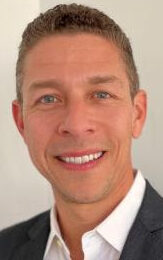 Ricardo Zúñiga (pictured) has been named global sports editor for the Associated Press, rejoining the AP from ESPN, where he serves as deputy director for the Americas, AP announced Thursday. “Ricardo brings a unique set of experiences to this key leadership role, having worked both at AP Sports and at our biggest sports customer,” the announcement said. “During his four years at ESPN, Ricardo has tackled everything from breaking news to big events to long-form video that appeals to global audiences of dedicated fans and non-sports followers alike.” A bio said, “Zúñiga was born in Puerto Rico and lived in Chile for a decade in his youth. He went to university in Puerto Rico before working for the Associated Press in San Juan, Mexico City and New York.”
Ricardo Zúñiga (pictured) has been named global sports editor for the Associated Press, rejoining the AP from ESPN, where he serves as deputy director for the Americas, AP announced Thursday. “Ricardo brings a unique set of experiences to this key leadership role, having worked both at AP Sports and at our biggest sports customer,” the announcement said. “During his four years at ESPN, Ricardo has tackled everything from breaking news to big events to long-form video that appeals to global audiences of dedicated fans and non-sports followers alike.” A bio said, “Zúñiga was born in Puerto Rico and lived in Chile for a decade in his youth. He went to university in Puerto Rico before working for the Associated Press in San Juan, Mexico City and New York.”
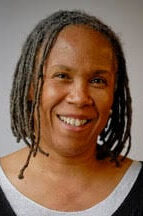 Longtime storyteller Cheryl Devall (pictured) has been named general manager of public radio station KRVS, a 100,000-watt outlet that reaches 12 parishes in south Louisiana, Adam Daigle reported Wednesday for the Arcadia (La.) Advocate. Devall has a background both in public radio and print journalism. “She was last working in the San Francisco Bay area, spending the past four years as an independent story editor for nonfiction podcasts and radio series,” Daigle wrote.
Longtime storyteller Cheryl Devall (pictured) has been named general manager of public radio station KRVS, a 100,000-watt outlet that reaches 12 parishes in south Louisiana, Adam Daigle reported Wednesday for the Arcadia (La.) Advocate. Devall has a background both in public radio and print journalism. “She was last working in the San Francisco Bay area, spending the past four years as an independent story editor for nonfiction podcasts and radio series,” Daigle wrote.
- “A new Pew Research Center study finds that the total number of reporters assigned to the 50 state capitols to inform citizens about legislative and administrative activity has increased by 11% since 2014, the last time this study was conducted,” the center reported April 5. “The gain comes largely from two main developments: new nonprofit news outlets that are employing statehouse reporters, and a shift to more part-time statehouse reporting. Indeed, although the total number of statehouse reporters has increased, fewer reporters are now covering state governments full time. . . .”
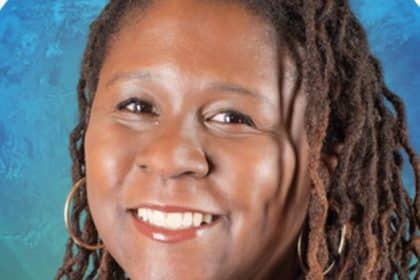 Narda Jones (pictured) is returning to the Federal Communications Commission as chief of staff for FCC Chairwoman Jessica Rosenworcel, Rosenwarcel announced April 4. Jones was director of legislative affairs for the White House Office of Science and Technology Policy. Prior to that, she was the senior technology policy adviser for the Democratic staff of the U.S. Senate Committee on Commerce, Transportation and Science. Ms. Jones started working in the United States Senate for Senator Maria Cantwell of Washington in 2014, after spending over a decade in senior roles in the Federal Communications Commission’s Wireline and International Bureaus,” the announcement said.
Narda Jones (pictured) is returning to the Federal Communications Commission as chief of staff for FCC Chairwoman Jessica Rosenworcel, Rosenwarcel announced April 4. Jones was director of legislative affairs for the White House Office of Science and Technology Policy. Prior to that, she was the senior technology policy adviser for the Democratic staff of the U.S. Senate Committee on Commerce, Transportation and Science. Ms. Jones started working in the United States Senate for Senator Maria Cantwell of Washington in 2014, after spending over a decade in senior roles in the Federal Communications Commission’s Wireline and International Bureaus,” the announcement said.
- Police in South Carolina have arrested a man who allegedly sent dozens of threats to Bakari Sellers, Black civil rights attorney, former state lawmaker and television commentator, the Associated Press reported Wednesday. Grant Edward Olson Jr., of Asheville, N.C., 48, was arrested April 8. Arrest warrants “show Olson sent dozens of messages to Sellers on Instagram that included racial slurs, indications that Olson was armed and mentioned the killings of African-Americans.”
- Catalina Camia has left her position as editor in chief at CQ Roll Call, Mariam Ahmed reported Sunday for Roll Call, but the veteran journalist did not disclose her next move. Camia joined CQ Roll Call in 2015 and is a former president of the Asian American Journalists Association and of Unity: Journalists of Color. Last month, Camia spoke with the National Press Foundation’s “Widening the Pipeline” fellows about how she leads a newsroom as a woman of color in the high-profile, high stakes arena of political reporting.
- “ ‘Code Switch,’ NPR’s signature podcast on race and identity, is expanding its presence on the radio, through live and virtual events and on social media through a $600,000 grant from the Corporation for Public Broadcasting (CPB),” the corporation announced Monday. “With this two-year grant, NPR is raising the profile of the Code Switch podcast and radio program with an expansion of live and online events and the development of new offerings. With the addition of a new host and a senior editor, the Code Switch team will increase its production of short, news pieces featured on NPR’s flagship news programs, as well as longer features written and produced by influential journalists and scholars, member station contributors, and Code Switch fellows. . . .”
- “Arizona State University’s Walter Cronkite School of Journalism and Mass Communication has launched a new graduate partnership with the Native American Journalists Association (NAJA) and Indian Country Today to support an outstanding NAJA member to pursue a master’s degree in the 2022–23 school year and produce content for the national Indian Country Today audience,” the school announced Monday.
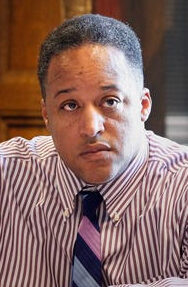 Royce Miles (pictured), who went from press operator at The Washington Post to executive vice president and general manager at the Milwaukee Journal Sentinel, the No. 2 spot to the publisher, “died unexpectedly” April 3 in Kenosha, Wis., Bill Glauber reported April 8, updated April 9, for the Journal Sentinel. He was 54. “Journal Sentinel reporter James Causey marveled how Miles, a top executive, became a fixture at conventions for the National Association of Black Journalists (NABJ). ‘He always told people how much he loved being in Milwaukee, how he loved what we did,’ Causey said. ‘Royce appreciated the contributions of journalists.’ . . .”
Royce Miles (pictured), who went from press operator at The Washington Post to executive vice president and general manager at the Milwaukee Journal Sentinel, the No. 2 spot to the publisher, “died unexpectedly” April 3 in Kenosha, Wis., Bill Glauber reported April 8, updated April 9, for the Journal Sentinel. He was 54. “Journal Sentinel reporter James Causey marveled how Miles, a top executive, became a fixture at conventions for the National Association of Black Journalists (NABJ). ‘He always told people how much he loved being in Milwaukee, how he loved what we did,’ Causey said. ‘Royce appreciated the contributions of journalists.’ . . .”
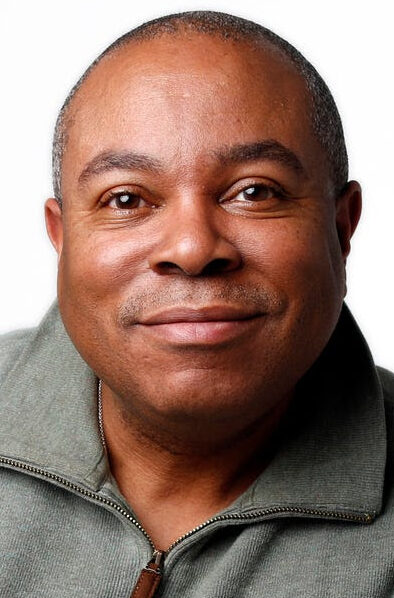 James Hill (pictured) is one of three senior editors at the Detroit Free Press who have been promoted to executive editor, Free Press Editor and Vice President Peter Bhatia announced, the newspaper said Sunday. Hill “has been at the Free Press for 22 years. Hill covered higher education, then City Hall, before moving into the editing ranks. He also has been a columnist and served on the editorial board. For the past 10 years, Hill has overseen political coverage, city and suburban news, led diversity recruiting efforts and DEI initiatives at the Free Press, coordinated the newsroom’s internship program and most recently conceived and launched Detroit Is, the Free Press’ initiative aimed at providing holistic coverage of the city. Hill was born and raised in Detroit — and is a die-hard Lions fan. He graduated from the Journalism Institute for Media Diversity at Wayne State University. . . .” Also promoted were Anjanette Delgado and Jim Schaefer.
James Hill (pictured) is one of three senior editors at the Detroit Free Press who have been promoted to executive editor, Free Press Editor and Vice President Peter Bhatia announced, the newspaper said Sunday. Hill “has been at the Free Press for 22 years. Hill covered higher education, then City Hall, before moving into the editing ranks. He also has been a columnist and served on the editorial board. For the past 10 years, Hill has overseen political coverage, city and suburban news, led diversity recruiting efforts and DEI initiatives at the Free Press, coordinated the newsroom’s internship program and most recently conceived and launched Detroit Is, the Free Press’ initiative aimed at providing holistic coverage of the city. Hill was born and raised in Detroit — and is a die-hard Lions fan. He graduated from the Journalism Institute for Media Diversity at Wayne State University. . . .” Also promoted were Anjanette Delgado and Jim Schaefer.
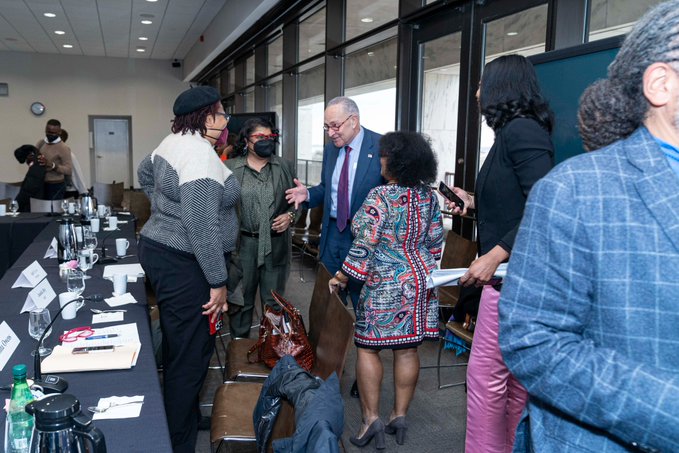
- ESPN’s Adam Schefter apologized for a tweet breaking the news of NFL quarterback Dwayne Haskins’ death, AR Shaw reported Monday for the Guardian. “Schefter caught backlash after listing Haskins’ career setbacks while reporting on his death, which occurred when the 24-year-old was hit by a truck in the early hours of Saturday morning. . . . “The sports community spoke out against Schefter’s tweet, which was posted at a time when Haskins’ family, friends, and former teammates were taking in the enormity of his death. Schefter would eventually delete the tweet, but the damage was done.”
- “Michele Norris, a columnist for The Washington Post opinion page who from 2002 to 2012 she was a host of NPR’s “All Things Considered,” has won the 2022 Goldsmith Career Award from the Shorenstein Center on Media, Politics and Public Policy at Harvard’s Kennedy School of Government. “The music of Michele’s writing is matched by its moral power,” said Shorenstein Center Director Nancy Gibbs. “She picks up the hard questions and examines them fearlessly, in a way that has made her one of the great, wise voices of this generation.”

- Writing April 8 about Chris Wallace, Michael Harriot told readers of the Grio that “the water-carrier-for-white-supremacy-turned-CNN+ host challenged Nikole Hannah-Jones, who has an actual degree in history and African-American studies, on actual history, African-Americans and her factual claims that the young white freedom fighters known as ‘the greatest generation’ were responsible for withholding democracy from Black Americans.” Mediaite’s account
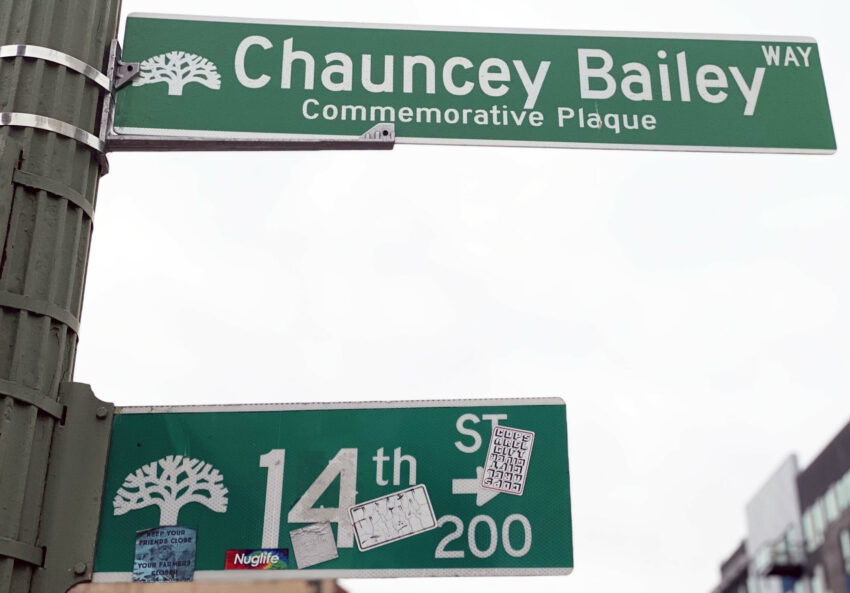
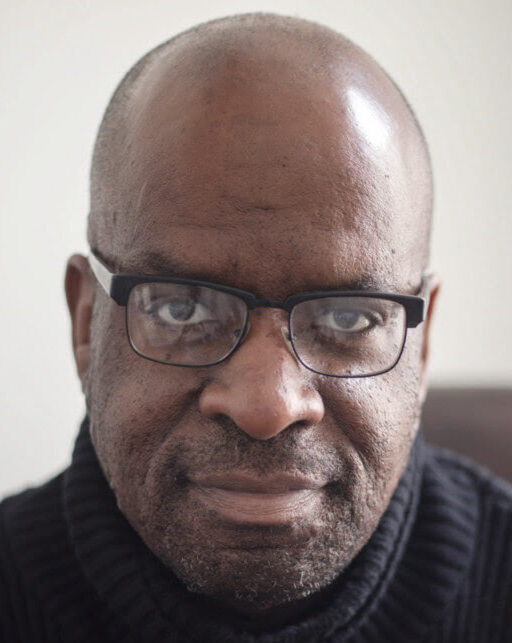 “In news first reported by Chicago media reporter Robert Feder and widely shared by former Chicago Tribune architecture critic Blair Kamin, Lee Bey (pictured), former architecture critic for the Tribune’s rival, the Chicago Sun-Times, will be returning to helm a monthly architecture column in that paper’s Sunday edition,” Matt Hickman wrote March 24 for Archpaper. “A current member of the editorial board at the Sun-Times, Chicago-born Bey is also a noted photographer and lecturer and serves as an adjunct professor at the Illinois Institute of Technology College of Architecture. . . .”
“In news first reported by Chicago media reporter Robert Feder and widely shared by former Chicago Tribune architecture critic Blair Kamin, Lee Bey (pictured), former architecture critic for the Tribune’s rival, the Chicago Sun-Times, will be returning to helm a monthly architecture column in that paper’s Sunday edition,” Matt Hickman wrote March 24 for Archpaper. “A current member of the editorial board at the Sun-Times, Chicago-born Bey is also a noted photographer and lecturer and serves as an adjunct professor at the Illinois Institute of Technology College of Architecture. . . .”
- Nicholas Casey will be joining the New York Times Magazine as a staff writer, effective immediately,” Jake Silverstein, editor of the Magazine, announced March 2. “At the Magazine, Nick will be an international correspondent, based in Spain, and writing on a range of subjects. We got a taste of Nick’s talent for magazine longform last year in his wonderful cover story about his father, where his assured sense of narrative and beautiful writing really stood out.” Casey was Madrid bureau chief and previously covered U.S. politics, Venezuela and Colombia.
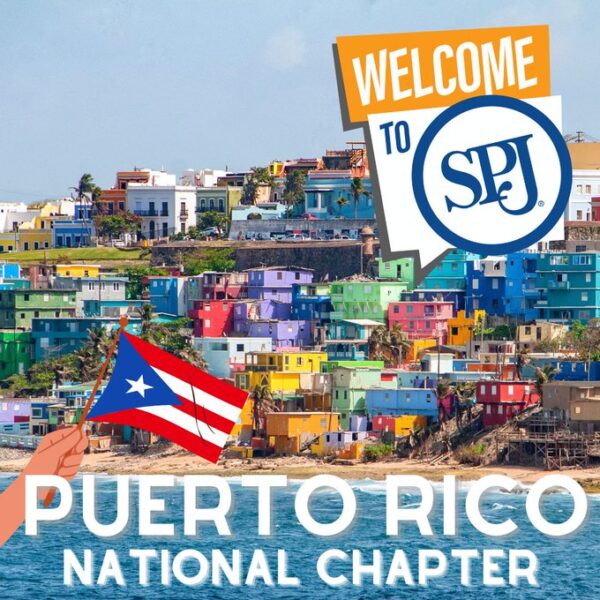
“This is a 1st in @spj_tweets 112 year history,” she wrote on March 23.
- “Former President Barack Obama is urgently throwing himself into the fight against disinformation, taking a yearslong private fascination into the open as he makes addressing the issue a key pillar of his post-presidency,” Dan Merica and Donie O’Sullivan reported Sunday or CNN. They also wrote, “Obama’s effort has been sweeping, say the former President’s confidants and outside advisers with experience in the tech industry, with Obama convening meetings and conversations with academics, activists, researchers, tech sector leaders, media executives, former government officials and former regulators. . . .”
- The John S. and James L. Knight Foundation announced April 8 “that nine universities and nonprofits were awarded more than $1.2 million to work on projects to identify solutions that help news organizations and civil society expose and lessen the impact of disinformation on communities of color. The grantees were winners of a Knight open call for proposals that advance independent scholarship, partnerships, tools and interventions to combat disinformation. . . .”
- “Financial Times reporter Alexandra White is receiving the Wiegold Prize in recognition of her talent for covering business topics,“ Chris Rousch reported April 8 for TalkingBizNews. “The prize honors the late Bloomberg Markets senior editor and 18-year veteran of The Wall Street Journal and is given by the CUNY Graduate School of Journalism to an alumnus.”
 The Washington Post has promoted Pulitzer Prize-winning opinion writer Jonathan Capehart (pictured) to associate editor. “The promotion is a reflection of Jonathan’s leadership at The Post where he has been a pivotal voice since 2007, both through his role on The Post’s editorial board and his weekly column exploring the intersection of social, cultural and political issues,” the March 30 announcement said. “Capehart hosts a weekly Opinions podcast, ‘Capehart,’ formerly named ‘Cape Up,’ and the weekly Washington Post Live show ‘First Look,’ which streams on Peacock, NBCUniversal’s streaming service. Capehart is also the host of ‘The Sunday Show with Jonathan Capehart,’ which airs Sundays 10:00 a.m. – 12:00 p.m. ET on MSNBC. In addition, he serves as a political analyst on ‘PBS NewsHour’ and is featured on the popular Friday segment, ‘Brooks and Capehart. ‘ . . .”
The Washington Post has promoted Pulitzer Prize-winning opinion writer Jonathan Capehart (pictured) to associate editor. “The promotion is a reflection of Jonathan’s leadership at The Post where he has been a pivotal voice since 2007, both through his role on The Post’s editorial board and his weekly column exploring the intersection of social, cultural and political issues,” the March 30 announcement said. “Capehart hosts a weekly Opinions podcast, ‘Capehart,’ formerly named ‘Cape Up,’ and the weekly Washington Post Live show ‘First Look,’ which streams on Peacock, NBCUniversal’s streaming service. Capehart is also the host of ‘The Sunday Show with Jonathan Capehart,’ which airs Sundays 10:00 a.m. – 12:00 p.m. ET on MSNBC. In addition, he serves as a political analyst on ‘PBS NewsHour’ and is featured on the popular Friday segment, ‘Brooks and Capehart. ‘ . . .”
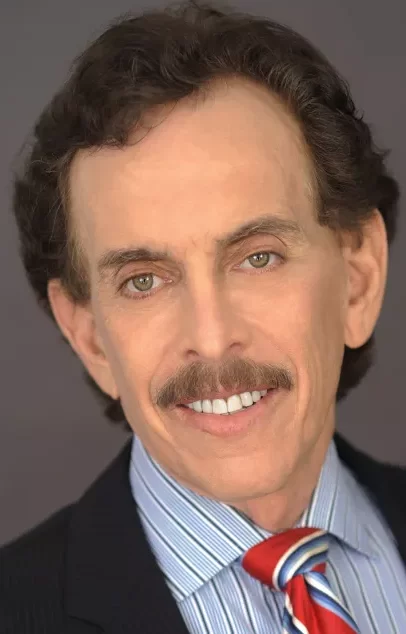 “Arnold Diaz (pictured), investigative reporter at WPIX New York, has retired,” Michael Malone reported April 6 for nexttv.com. “Diaz has been on TV for 50 years. His investigative franchise on WPIX is called ‘What a Shame!’ and ‘regularly exposes wrongdoing and incompetence by private industry and government agencies, and often leads to actions by law enforcement officials, as well as the enactment of legislation.’ ”
“Arnold Diaz (pictured), investigative reporter at WPIX New York, has retired,” Michael Malone reported April 6 for nexttv.com. “Diaz has been on TV for 50 years. His investigative franchise on WPIX is called ‘What a Shame!’ and ‘regularly exposes wrongdoing and incompetence by private industry and government agencies, and often leads to actions by law enforcement officials, as well as the enactment of legislation.’ ”
- A memorial planned to honor children who died at an Indian boarding school has received a $2 million grant from the Mellon Foundation that pushes the project beyond its initial fundraising targets, Stewart Huntington reported Monday for Indian Country Today. He also wrote, “International attention has been focused anew on residential schools since May 2021, when more than 200 graves were found at the former site of the Kamloops Residential School in British Columbia, Canada. The creation of a Truth and Reconciliation Commission in Canada in 2008 has led to settlements, the release of historical records and apologies from Canadian officials. The U.S. has been slower to respond, but that could be changing. . . .”
 Corey Johnson (pictured) is joining ProPublica from the Tampa Bay Times, where he worked for five years as an investigative reporter, ProPublica announced Tuesday. “His project ‘Poisoned’ revealed how Florida’s only lead smelter endangered hundreds of workers and polluted the surrounding community. . . .” The organization also hired Andy Kroll, Washington bureau chief for Rolling Stone, and Brett Murphy of USA Today.
Corey Johnson (pictured) is joining ProPublica from the Tampa Bay Times, where he worked for five years as an investigative reporter, ProPublica announced Tuesday. “His project ‘Poisoned’ revealed how Florida’s only lead smelter endangered hundreds of workers and polluted the surrounding community. . . .” The organization also hired Andy Kroll, Washington bureau chief for Rolling Stone, and Brett Murphy of USA Today.
 Maya Brown (pictured), of Freeport, N.Y., a senior journalism and political science double major at Stony Brook University on Long Island, N.Y., has been awarded the National Association of Hispanic Journalists’ first scholarship for Afro-Latino students pursuing careers in English and Spanish-language journalism.
Maya Brown (pictured), of Freeport, N.Y., a senior journalism and political science double major at Stony Brook University on Long Island, N.Y., has been awarded the National Association of Hispanic Journalists’ first scholarship for Afro-Latino students pursuing careers in English and Spanish-language journalism.
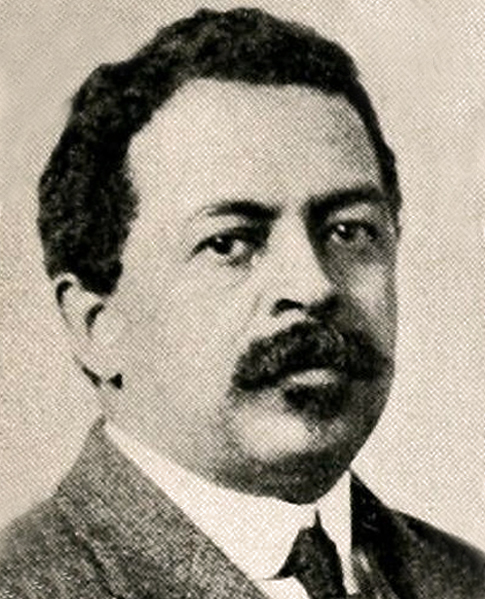 To commemorate what would have been activist Boston publisher William Monroe Trotter’s (pictured)150th birthday, the Rev. Cornell Brooks, the founder of the William Monroe Trotter Collaborative for Social Justice at Harvard University, held a symposium April 7 and 8 to honor his legacy, Tori Bedford reported in a podcast April 7 for WGBH radio, known as GBH News.
To commemorate what would have been activist Boston publisher William Monroe Trotter’s (pictured)150th birthday, the Rev. Cornell Brooks, the founder of the William Monroe Trotter Collaborative for Social Justice at Harvard University, held a symposium April 7 and 8 to honor his legacy, Tori Bedford reported in a podcast April 7 for WGBH radio, known as GBH News.
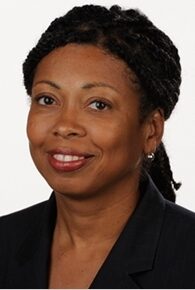 Veteran reporter Melanie Eversley (pictured) has been named executive managing editor of the National Association of Black Journalists’ soon-to-launch NABJ Black News and Views (BNV) platform. “Eversley will oversee content, personnel and other resources earmarked for BNV. Once launched later this year, BNV will make history as NABJ’s first-ever digital news platform focused on issues and perspectives relevant to the Black community,” NABJ announced on April 4.
Veteran reporter Melanie Eversley (pictured) has been named executive managing editor of the National Association of Black Journalists’ soon-to-launch NABJ Black News and Views (BNV) platform. “Eversley will oversee content, personnel and other resources earmarked for BNV. Once launched later this year, BNV will make history as NABJ’s first-ever digital news platform focused on issues and perspectives relevant to the Black community,” NABJ announced on April 4.
- The Haitian Times in Brooklyn, N.Y., is one of four news organizations awarded one-year fellowships by the Chronicle of Philanthropy. It is to report on foundations and nonprofits working to find solutions in New York’s Haitian community, determining whether nonprofits and foundations are making a difference, and what could help them do even more to solve problems, the Chronicle said.
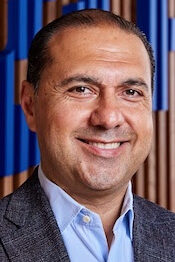 “ Luis Patiño (pictured), a former president and GM for Univision Media Group, will lead Austin PBS in Texas as CEO,” Julian Wyllie reported March 23 for Current.
“ Luis Patiño (pictured), a former president and GM for Univision Media Group, will lead Austin PBS in Texas as CEO,” Julian Wyllie reported March 23 for Current.
- “In a study conducted by Fundamedios with support from the Donald W. Reynolds Journalism Institute Fellowship, the organization interviewed 115 journalists and looked at pay studies from several newsrooms. ‘The most common claim expressed was about differences in their working conditions or contracts,” Stephanie Casanova wrote April 5 for the Women’s Media Center. The headline was, “The Low-Balling of Spanish-Language Reporters.” “Latino journalists do the same job as their white peers with fewer resources, and less pay,’ the study found. . . .”
 “I have just written my last story for the Wall Street Journal,” Lee Hawkins (pictured) wrote March 25 on LinkedIn. “It is a Page One story about the ongoing debate that has resulted from the reality that the Jesuits used the profits from slavery to found Georgetown University and dozens of other Catholic colleges and high schools. Kudos to my co-writer and colleague, Doug Belkin, for a great job. It’s been a great 19-year journey. I will miss my colleagues and friends. In the coming weeks, we will be excited to announce my next venture: a foray into the podcasting world, where I will be doing more around the subjects of race and equity in America. I will also be speaking ahead of the release my forthcoming book, NOBODY’S SLAVE: How Uncovering My Family’s History Set Me Free (HarperCollins 2023).”
“I have just written my last story for the Wall Street Journal,” Lee Hawkins (pictured) wrote March 25 on LinkedIn. “It is a Page One story about the ongoing debate that has resulted from the reality that the Jesuits used the profits from slavery to found Georgetown University and dozens of other Catholic colleges and high schools. Kudos to my co-writer and colleague, Doug Belkin, for a great job. It’s been a great 19-year journey. I will miss my colleagues and friends. In the coming weeks, we will be excited to announce my next venture: a foray into the podcasting world, where I will be doing more around the subjects of race and equity in America. I will also be speaking ahead of the release my forthcoming book, NOBODY’S SLAVE: How Uncovering My Family’s History Set Me Free (HarperCollins 2023).”
- “El Salvadoran journalists are raising the alarm over a new law that could imprison journalists for 10 to 15 years,” Foreign Press Correspondents USA reported Tuesday. “The country’s congress has authorized harsh prison sentences for news media that reproduce or disseminate messages from gangs, playing into President Nayib Bukele’s long-standing war with press freedoms in the country. A flurry of gang killings in late March prompted Bukele to seek out and win emergency powers, which resulted in the arrests and detainment of some 6,000 people and the penning of the new legislation.”
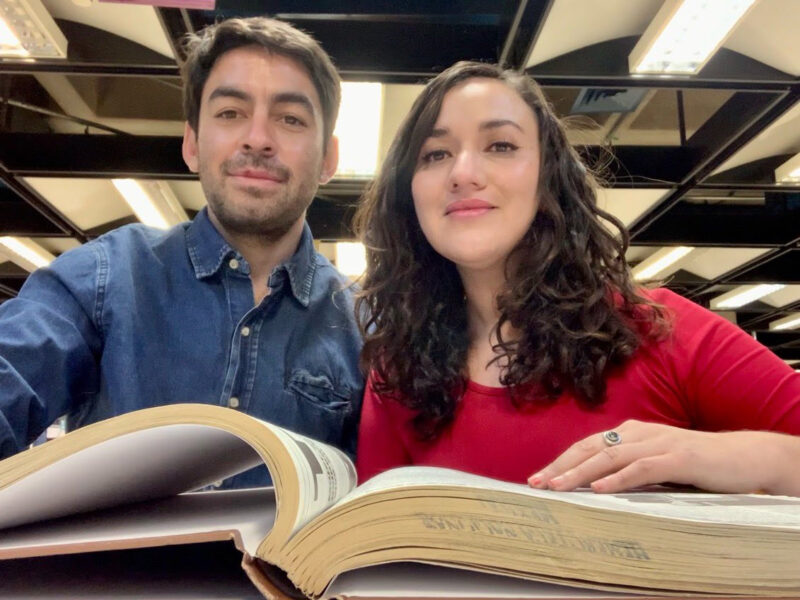
- In Mexico, journalists Dardo Neubauer and Laura Sánchez Ley launched Archivero (which means “archivist”) last month, Hanaa’ Tameez wrote Monday for Nieman Lab. “They request public records to have them declassified and reveal information that the government kept secret. Their goal is to add context and follow up on current stories in the news and unsolved cases, and to find threads for future stories. Archivero’s work is currently free to access. Sánchez and Neubauer are a team of two and neither of them works on Archivero full-time. They’re funding the project themselves, though they offer paid research and consulting services. They also offer workshops and trainings on Mexico’s transparency laws and the United States’ Freedom of Information Act. . . .”
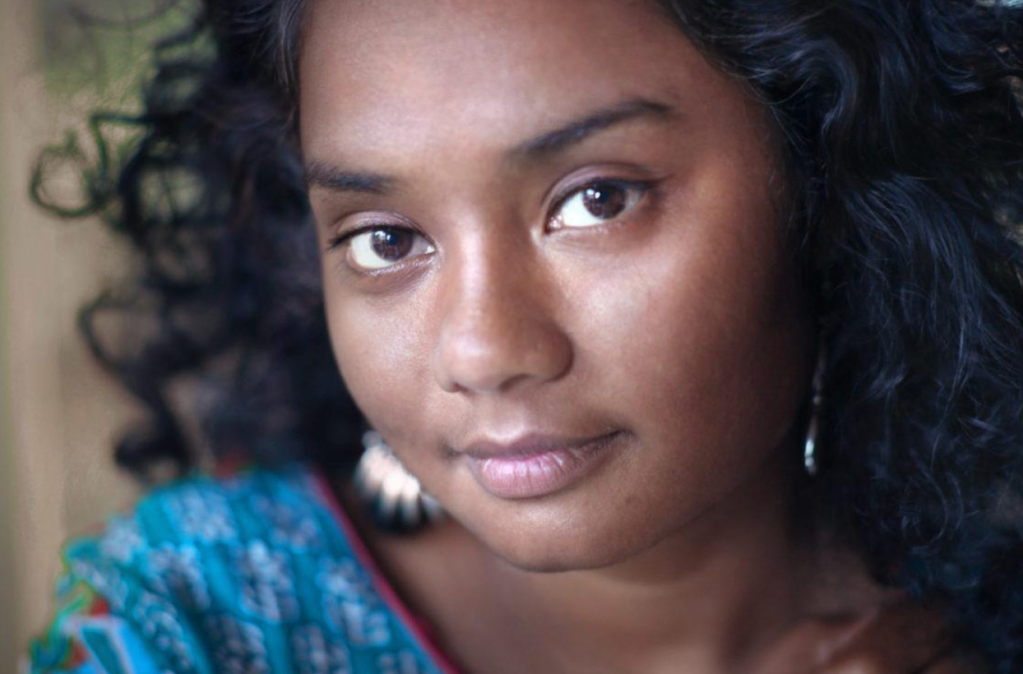 “Journalists who come from minority backgrounds often face multiple challenges at work and in their personal life,” Ruby Winter wrote for the April issue of Toxic Avenger magazine. “From their gender identity to their race, their religious expression to their opinions about social issues – all of them are used by trolls to target them online and off. One of these vulnerable circles are journalists who belong to the Dalit caste, originating in South Asia. In this age-old system, a person is assigned a caste at the time of their birth and this limits every aspect of their life from what jobs they can pursue to whom they can marry. . . . As April is Dalit History Month, we spoke to Thenmozhi Soundararajan (pictured), executive director of Equality Labs – an organization dedicated to fighting for the civil rights of Dalits and her team to get insight into the experiences of Dalit reporters. . . . “
“Journalists who come from minority backgrounds often face multiple challenges at work and in their personal life,” Ruby Winter wrote for the April issue of Toxic Avenger magazine. “From their gender identity to their race, their religious expression to their opinions about social issues – all of them are used by trolls to target them online and off. One of these vulnerable circles are journalists who belong to the Dalit caste, originating in South Asia. In this age-old system, a person is assigned a caste at the time of their birth and this limits every aspect of their life from what jobs they can pursue to whom they can marry. . . . As April is Dalit History Month, we spoke to Thenmozhi Soundararajan (pictured), executive director of Equality Labs – an organization dedicated to fighting for the civil rights of Dalits and her team to get insight into the experiences of Dalit reporters. . . . “
- “Last year, the African Union in partnership with UNESCO and other press freedom and media organizations, launched a digital platform to track attacks on journalists, help protect them, and hold perpetrators to account,” Patrick Egwu and Ifesinachi Ayogu reported Feb. 4 for the International Journalists’ Network. Noting that “media workers are increasingly arrested, harassed and killed while on the job,” the writers said, “The Platform for the Protection of Journalism and Safety of Journalists in Africa has identified four key objectives: promoting partnerships, prevention, protection and prosecution of perpetrators of crimes against journalists on the continent. This, those behind the initiative say, would be achieved through ‘real time monitoring, reporting and follow-up actions by both the duty and right bearers.’ . . .”
- “Israeli officials recently hosted representatives of Morocco, Egypt, Bahrain and the United Arab Emirates,” Ari Paul reported April 5 for Fairness & Accuracy In Reporting. “For US media, this meant many things, but one thing that didn’t make the papers was that Israel and Morocco share a common goal: maintaining military occupations that are widely condemned throughout the world. . . . What was missing from most of the reports on this subject — or in some cases buried — is Morocco’s ongoing occupation of the Western Sahara region.”
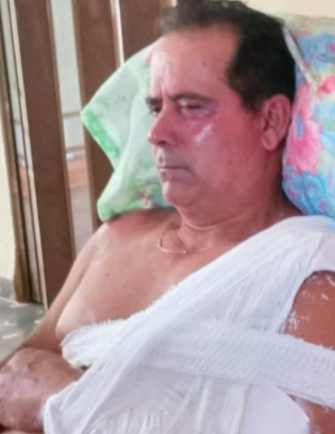 “Cuban authorities should thoroughly investigate the recent attack on journalist Alberto Corzo (pictured) and swiftly bring those responsible to justice,” the Committee to Protect Journalists said April 8. “On April 1, at approximately 10 a.m., two agents from the Department of State Security, commonly referred to as the political police, stopped Corzo in the street in the Colón municipality in the western Matanzas province, and demanded to know where he was headed and what he was doing, Corzo said in a video statement published by the Cuban Institute for Freedom of Expression and of the Press (ICLEP), a press freedom organization which also publishes and distributes seven community newspapers in Cuba. Corzo is ICLEP’s executive director. . . Cuban authorities have repeatedly targeted ICLEP journalists and outlets with various forms of harassment in retaliation for their independent reporting, including raids, detentions, and other forms of coercion. Corzo has been previously targeted with several intimidation tactics by Cuban authorities, including being arrested and interrogated, as documented by CPJ.” (Photo credit: ICLEP)
“Cuban authorities should thoroughly investigate the recent attack on journalist Alberto Corzo (pictured) and swiftly bring those responsible to justice,” the Committee to Protect Journalists said April 8. “On April 1, at approximately 10 a.m., two agents from the Department of State Security, commonly referred to as the political police, stopped Corzo in the street in the Colón municipality in the western Matanzas province, and demanded to know where he was headed and what he was doing, Corzo said in a video statement published by the Cuban Institute for Freedom of Expression and of the Press (ICLEP), a press freedom organization which also publishes and distributes seven community newspapers in Cuba. Corzo is ICLEP’s executive director. . . Cuban authorities have repeatedly targeted ICLEP journalists and outlets with various forms of harassment in retaliation for their independent reporting, including raids, detentions, and other forms of coercion. Corzo has been previously targeted with several intimidation tactics by Cuban authorities, including being arrested and interrogated, as documented by CPJ.” (Photo credit: ICLEP)
To subscribe at no cost, please send an email to journal-isms+subscribe@groups.io and say who you are.
Facebook users: “Like” “Richard Prince’s Journal-isms” on Facebook.
Follow Richard Prince on Twitter @princeeditor
Richard Prince’s Journal-isms originates from Washington. It began in print before most of us knew what the internet was, and it would like to be referred to as a “column.” Any views expressed in the column are those of the person or organization quoted and not those of any other entity. Send tips, comments and concerns to Richard Prince at journal-isms+owner@
View previous columns (after Feb. 13, 2016).
View previous columns (before Feb. 13, 2016)
- Diversity’s Greatest Hits, 2018 (Jan. 4, 2019)
- Book Notes: Is Taking a Knee Really All That? (Dec. 20, 2018)
- Book Notes: Challenging ’45’ and Proudly Telling the Story (Dec. 18, 2018)
- Book Notes: Get Down With the Legends! (Dec. 11, 2018)
- Journalist Richard Prince w/Joe Madison (Sirius XM, April 18, 2018) (podcast)
- Richard Prince (journalist) (Wikipedia entry)
- February 2018 Podcast: Richard “Dick” Prince on the need for newsroom diversity (Gabriel Greschler, Student Press Law Center, Feb. 26, 2018)
- Diversity’s Greatest Hits, 2017 — Where Will They Take Us in the Year Ahead?
- Book Notes: Best Sellers, Uncovered Treasures, Overlooked History (Dec. 19, 2017)
- An advocate for diversity in the media is still pressing for representation, (Courtland Milloy, Washington Post, Nov. 28, 2017)
- Morgan Global Journalism Review: Journal-isms Journeys On (Aug. 31, 2017)
- Diversity’s Greatest Hits, 2016
- Book Notes: 16 Writers Dish About ‘Chelle,’ the First Lady
- Book Notes: From Coretta to Barack, and in Search of the Godfather
- Journal-isms’ Richard Prince Wants Your Ideas (FishbowlDC, Feb. 26, 2016)
- “JOURNAL-ISMS” IS LATEST TO BEAR BRUNT OF INDUSTRY’S ECONOMIC WOES (Feb. 19, 2016)
- Richard Prince with Charlayne Hunter-Gault, “PBS NewsHour,” “What stagnant diversity means for America’s newsrooms” (Dec. 15, 2015)
- Book Notes: Journalists Follow Their Passions
- Book Notes: Journalists Who Rocked Their World
- Book Notes: Hands Up! Read This!
- Book Notes: New Cosby Bio Looks Like a Best-Seller
- Journo-diversity advocate turns attention to Ezra Klein project (Erik Wemple, Washington Post, March 5, 2014)
When you shop @AmazonSmile, Amazon will make a donation to Journal-Isms Inc. https://t.co/OFkE3Gu0eK
— Richard Prince (@princeeditor) March 16, 2018

